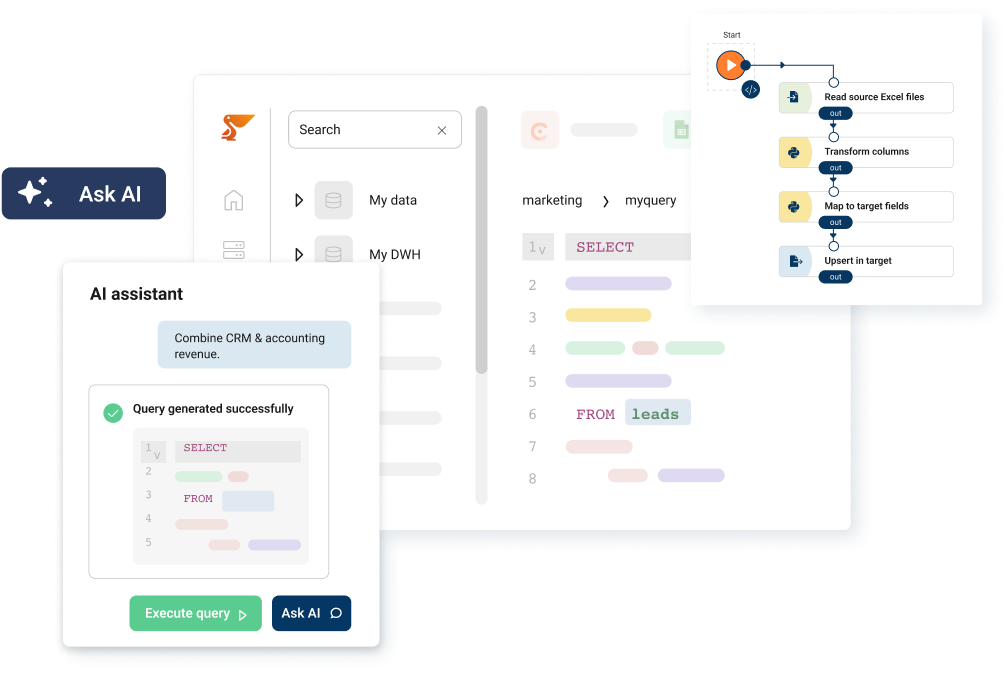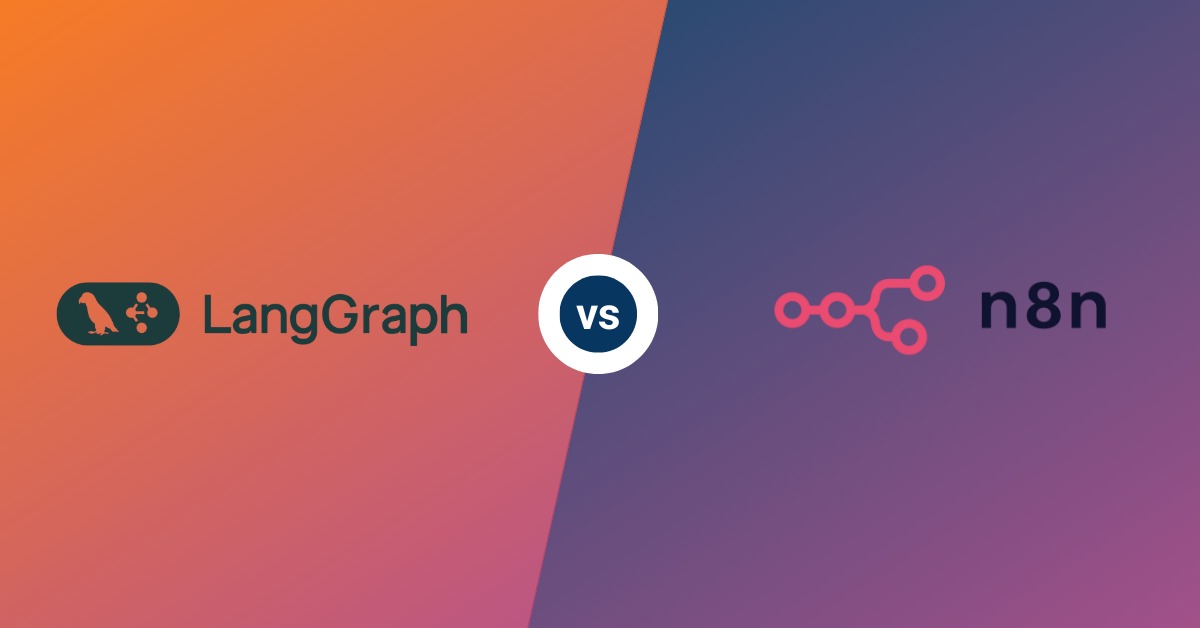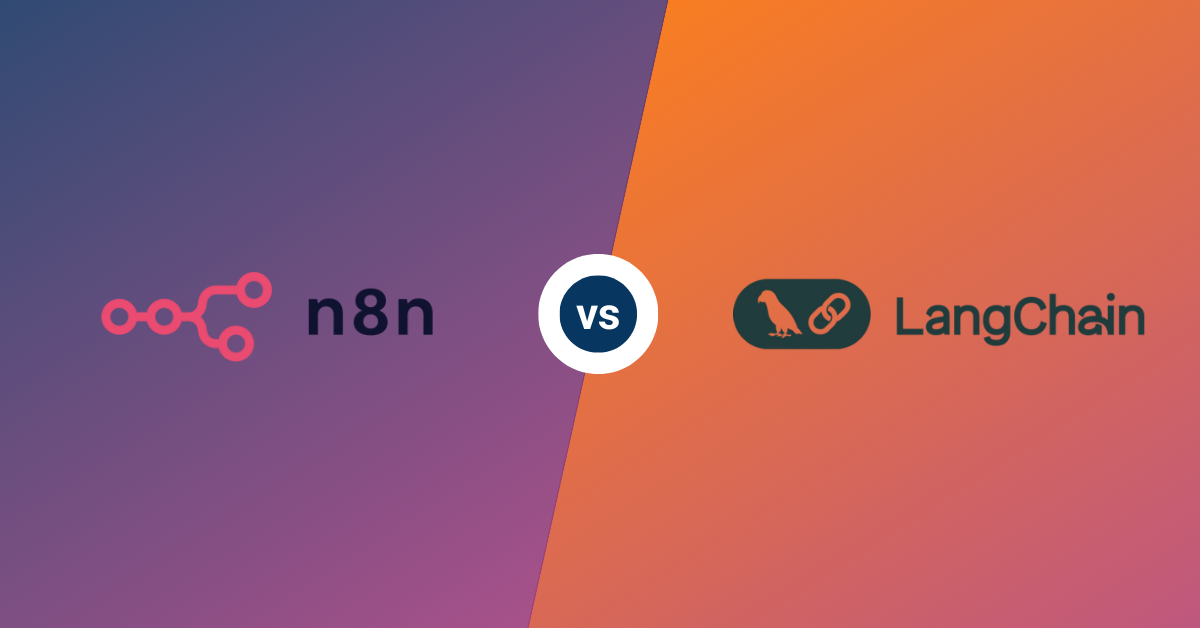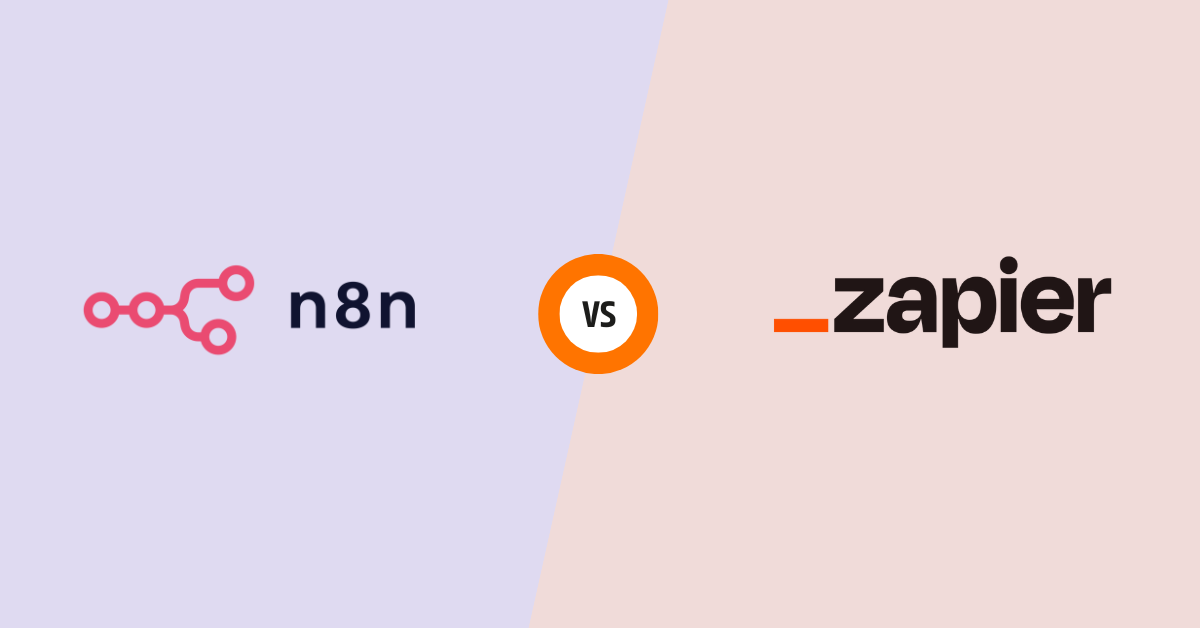In today’s data-driven world, organizations are constantly bombarded with information from various sources. Managing, analyzing, and extracting insights from this vast sea of data can be a daunting task. This is where data automation tools come into play.
These powerful software solutions streamline the entire data lifecycle, from collection and transformation to analysis and reporting, minimizing manual intervention and maximizing efficiency.
Why Use Data Automation Tools?
The benefits of embracing data automation are numerous. Here are some key reasons why you should consider incorporating these tools into your data management strategy:
- Increased Efficiency: Automating repetitive tasks frees up your data team’s valuable time, allowing them to focus on more strategic initiatives like data analysis and interpretation.
- Improved Accuracy: Manual data handling is prone to errors. Automation tools minimize human error and ensure data consistency and accuracy.
- Enhanced Scalability: As your data volume grows, automation tools can handle the increased workload seamlessly, ensuring smooth data processing regardless of the scale.
- Faster Time to Insights: Automating data pipelines allows you to access valuable insights from your data faster, enabling quicker decision-making.
- Reduced Costs: By minimizing manual effort and improving efficiency, data automation tools can significantly reduce your overall data management costs.
10 Best Data Automation Tools
The demand for data automation is rapidly increasing as businesses recognize the immense value it offers. In fact, a recent study by source:
- According to a McKinsey survey, 70% of organizations are at least piloting automation technologies in one or more business units.
- 90% of IT users claim automation has made them much more satisfied with collaboration across departments.
- According to IDC’s Future Enterprise Resiliency and Spending Survey, 30% of organizations are more than 50% done with their automation goals.
This surge in adoption highlights the critical role data automation plays in empowering businesses to make data-driven decisions and achieve their strategic goals.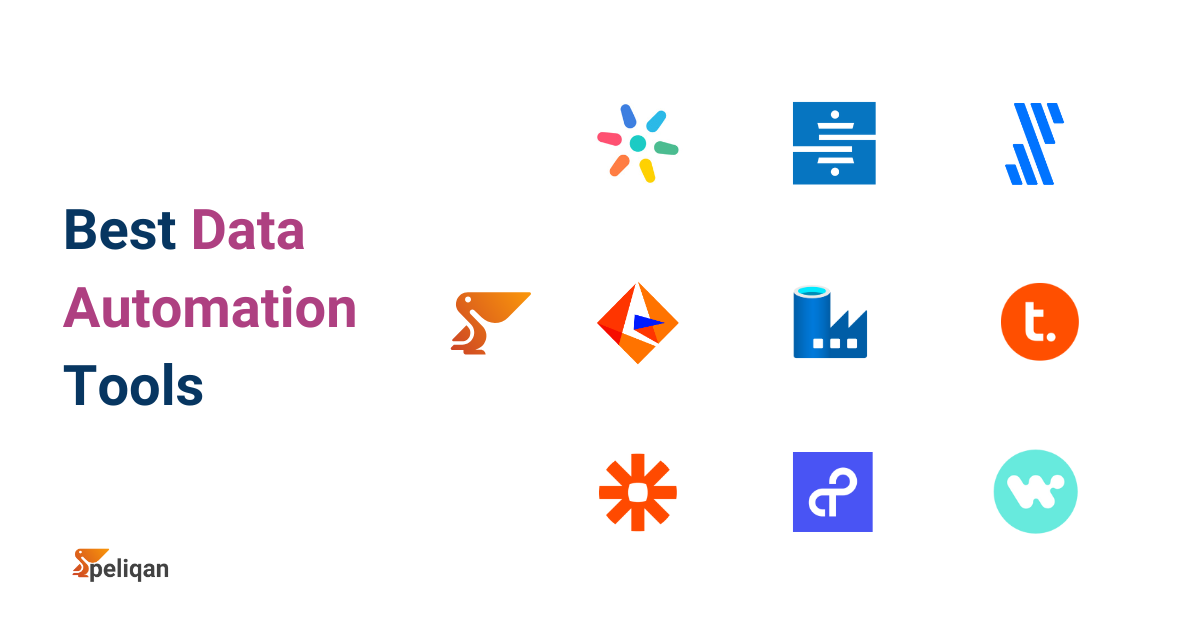
With a plethora of data automation tools available in the market, choosing the right one for your needs can be overwhelming. Here’s a comprehensive look at the top 10 data automation tools, with Peliqan.io leading the pack:
1. Peliqan.io 
Peliqan.io stands out as a robust and user-friendly data automation platform designed to simplify complex data tasks. It offers a comprehensive suite of features for data extraction, transformation, loading (ETL), orchestration, and data activation, allowing you to build and manage data pipelines with ease.
Key Features:
- Pre-built connectors for seamless integration with various data sources.
- Build interactive data apps with low-code scripts.
- Data transformation by combining SQL and Python.
- Cloud-based platform for scalability and accessibility.
- Advanced scheduling and monitoring functionalities.
Benefits of using Peliqan.io:
- Faster Data Integration: Peliqan.io’s intuitive interface allows you to integrate data from diverse sources quickly and efficiently.
- Simplified Data Pipelines: Build complex data workflows with ease.
- Enhanced Data Quality: Ensure data accuracy with real-time queries.
- Improved Visibility and Control: Monitor your data pipelines and identify potential issues proactively.
Pricing: Free trial, Paid plans with custom quotes based on features and data volume.
2. Hevo Data

Hevo Data is a cloud-based, fully managed data pipeline platform. It offers real-time data replication from various sources to your data warehouse, eliminating the need for code or complex ETL processes.
Key Features:
- Automated data replication in real-time.
- Pre-built connectors for various data sources and destinations.
- Automatic schema management.
- Data transformation capabilities.
Benefits of using Hevo Data:
- Real-time Data Replication: Access the latest data insights with Hevo’s real-time data replication capabilities.
- Simplified Data Integration: Eliminate the need for coding with pre-built connectors and automated processes.
- Reduced Operational Overhead: Hevo’s fully managed platform minimizes the need for ongoing maintenance.
3. Stitch Data
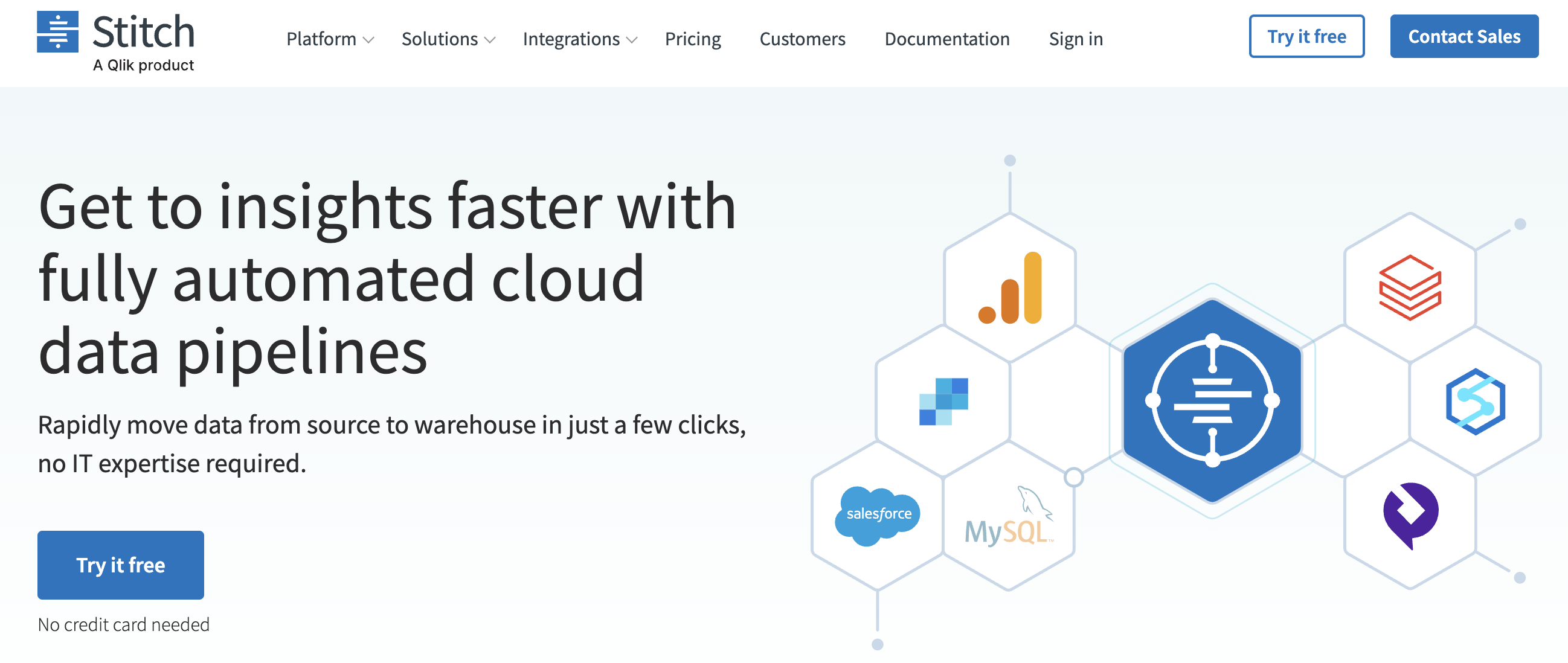
Stitch Data is another popular data integration platform that allows you to extract data from various sources and load it into your data warehouse. It provides a user-friendly interface and pre-built connectors for various applications.
Key Features:
- Robust data extraction and loading capabilities.
- Pre-built connectors for a wide range of data sources.
- Transformation capabilities for data manipulation.
- Support for scheduled data refreshes.
Benefits of using Stitch Data:
- Streamlined Data Integration: Stitch simplifies the process of extracting and loading data from multiple sources.
- User-friendly Interface: Build your data pipelines with ease using the intuitive interface.
- Flexible Data Transformation: Customize your data to fit your specific needs with transformation capabilities.
4. Fivetran
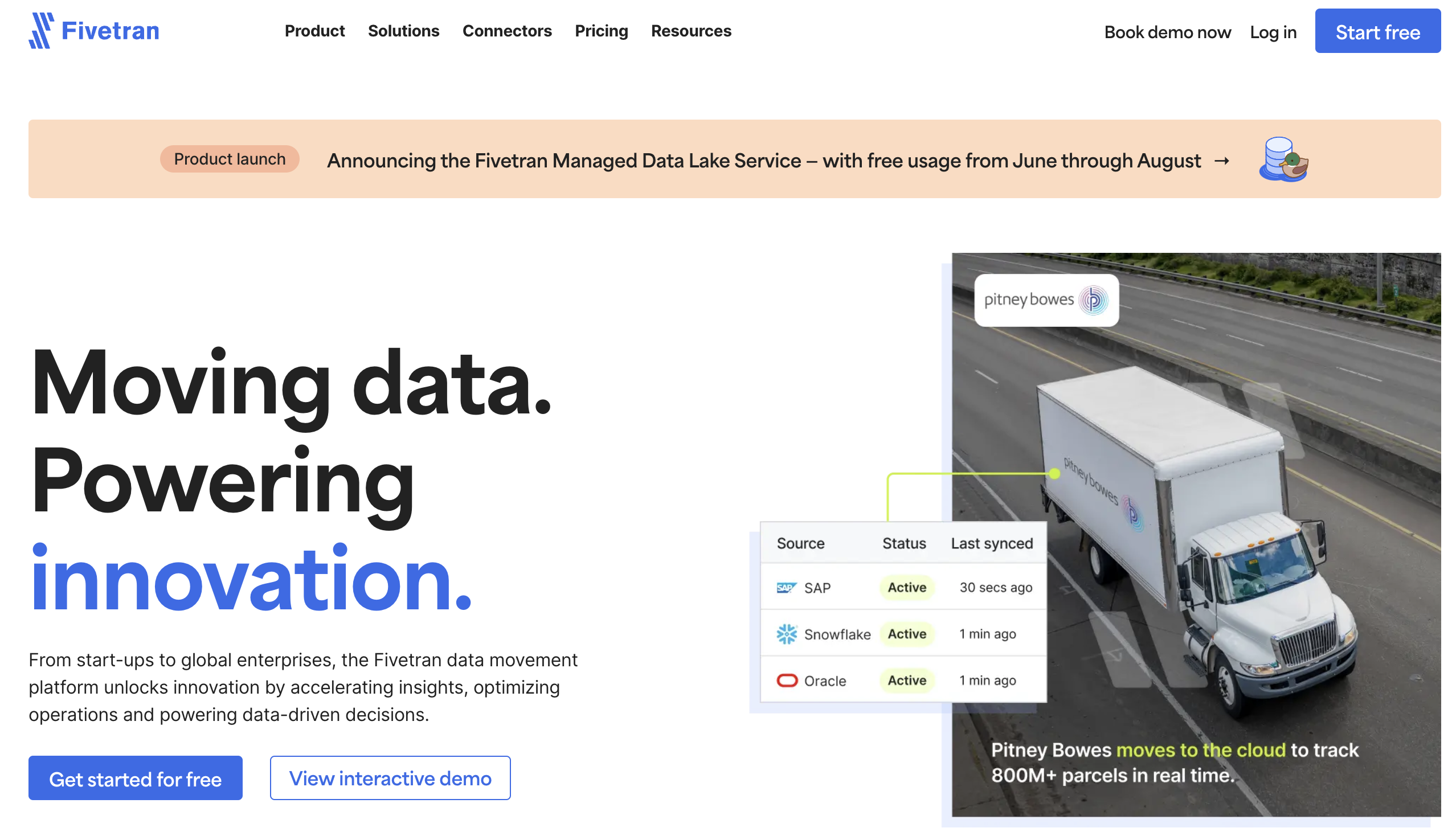
Fivetran is a cloud-based ETL platform that automates the process of extracting, transforming, and loading data into your data warehouse. It focuses on providing a high-performance and reliable data integration solution.
Key Features:
- Automated data pipelines with high-performance processing.
- Pre-built connectors for various data sources.
- Automatic schema management and data type conversion.
- Continuous data replication for real-time insights.
Benefits of using Fivetran:
- High-Performance Data Integration: Fivetran ensures efficient data movement with its focus on performance and scalability.
- Reduced Development Time: Pre-built connectors and automated processes minimize development overhead.
- Real-time Data Updates: Access the latest data with continuous data replication for informed decision-making.
5. Informatica PowerCenter
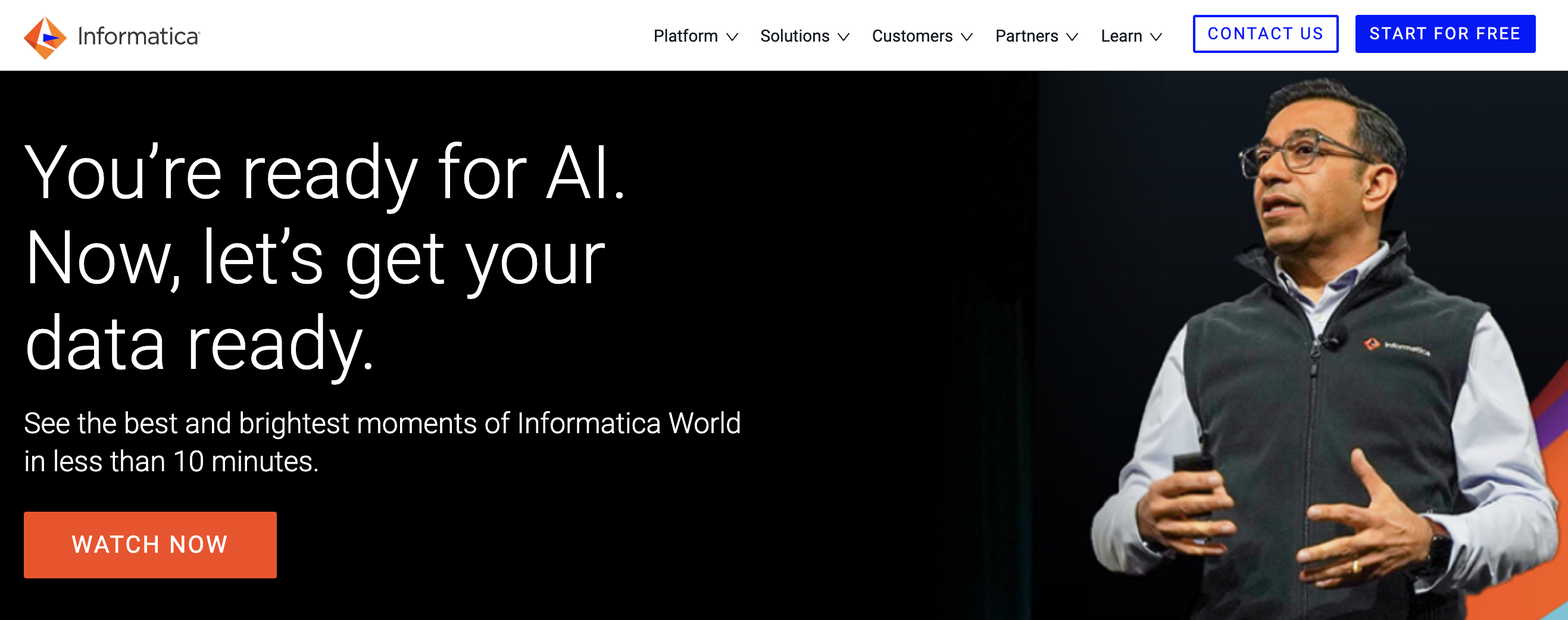
Informatica PowerCenter is a robust on-premise data integration platform that caters to complex data needs. It offers a comprehensive set of features for data extraction, transformation, loading, and quality management.
Key Features:
- Extensive data mapping and transformation capabilities.
- High-volume data processing capabilities for large datasets.
- Workflow automation and scheduling functionalities.
- Data quality management tools for ensuring data accuracy.
Benefits of using Informatica PowerCenter:
- Comprehensive Data Management: PowerCenter provides a wide range of features for handling complex data tasks.
- High-Performance Data Processing: Efficiently handle large datasets with PowerCenter’s robust processing capabilities.
- Improved Data Quality: Maintain data integrity with built-in data quality management tools.
6. Azure Data Factory (ADF)

Microsoft Azure Data Factory (ADF) is a cloud-based ETL and data orchestration service offered by Microsoft. It allows you to create data pipelines for ingesting, transforming, and loading data into various Azure data services.
Key Features:
- Cloud-based platform for scalability and accessibility.
- Integration with various Azure data services.
- Visual interface for building data pipelines.
- Support for various data processing activities like data cleansing and transformation.
Benefits of using Azure Data Factory (ADF):
- Seamless Integration with Azure Services: Leverage the power of Azure cloud services for data management.
- Scalable Data Pipelines: Build data pipelines that can handle growing data volumes.
- User-friendly Interface: Design your data workflows with ease using the visual interface.
7. Talend Open Studio

Talend Open Studio is a popular open-source data integration platform. It offers a comprehensive set of tools for data extraction, transformation, and loading, catering to both technical and non-technical users.
Key Features:
- Open-source platform with a large user community.
- Drag-and-drop interface for building data pipelines.
- Extensive data transformation capabilities.
- Support for various data sources and destinations.
Benefits of using Talend Open Studio:
- Cost-effective Solution: Open-source platform that eliminates licensing costs.
- Large User Community: Access support and resources from a vast community of users.
- User-friendly Interface: Build data pipelines visually without extensive coding knowledge.
8. Zapier

Zapier is a popular integration platform that allows you to automate workflows between various online applications and services. It offers a user-friendly interface and pre-built connections, or “Zaps,” for hundreds of popular applications.
Key Features:
- Drag-and-drop interface for building workflows (Zaps).
- Pre-built connections for various applications.
- Conditional logic for building complex workflows.
- Free plan with limited features and paid plans for additional functionality.
Benefits of using Zapier:
- Simple and User-friendly: Build automated workflows between applications without coding knowledge.
- Wide Range of Integrations: Connect Zapier to hundreds of popular applications for data transfer and task automation.
- Flexibility: Create conditional logic within your workflows for increased automation complexity.
- Cost-effective: Free plan available for basic needs with paid plans offering additional features.
9. Tray.io

Tray.io is another powerful integration platform that focuses on enterprise-grade data automation. It offers a robust set of features for building complex workflows and integrations across various applications, making it a reliable choice for businesses seeking advanced Workflow management Software solutions.
Key Features:
- Scalable platform for handling large-scale integrations.
- Security features for enterprise deployments.
- Advanced data mapping and transformation capabilities.
- Pre-built connectors for various applications.
Benefits of using Tray.io:
- Enterprise-grade Scalability: Tray.io handles complex data flows and large-scale integrations with ease.
- Enhanced Security: Built-in security features ensure data privacy and compliance with regulations.
- Powerful Data Management: Advanced data mapping and transformation capabilities for data manipulation.
10. Workato

Workato is a comprehensive integration and automation platform designed for businesses of all sizes. It offers a user-friendly interface and robust features for building complex data workflows and automating business processes.
Key Features:
- Pre-built connectors for various applications and cloud services.
- Data mapping and transformation capabilities for data manipulation.
- Workflow scheduling and monitoring functionalities.
- Advanced features like API management and robotic process automation (RPA).
Benefits of using Workato:
- User-friendly and Scalable: Workato caters to both technical and non-technical users and scales to meet the needs of growing businesses.
- Wide Range of Integrations: Connect Workato to a vast library of applications and cloud services for seamless data flow.
- Advanced Automation Capabilities: Build complex workflows and automate business processes beyond basic data transfer.
- Enhanced Visibility and Control: Schedule your workflows and monitor their performance for proactive troubleshooting.
Data Automation tools Comparison
In order to make informed decisions regarding data automation tools, it is essential to conduct a thorough comparison of the top data automation platforms available in the market.
Choosing the Right Data Automation Tool
The right data automation tool for you depends on your specific needs and requirements. Here are some factors to consider when making your decision:
- Data Volume and Complexity: Consider the volume and complexity of your data. Some tools excel at handling massive datasets, while others cater to simpler integrations.
- Technical Expertise: Evaluate your team’s technical skills. Some tools require coding knowledge, while others offer user-friendly interfaces for non-technical users.
- Scalability: Choose a tool that can scale with your growing data needs to ensure smooth operation as your data volume increases.
- Budget: Consider your budget constraints and choose a tool that aligns with your financial resources. There are both open-source and paid data automation solutions available.
- Specific Needs: Identify any specific functionalities you require, such as advanced data transformation capabilities, API management, or robotic process automation (RPA).
Conclusion
Data automation tools play a crucial role in enabling organizations to extract maximum value from their data. By automating repetitive tasks and streamlining data pipelines, these tools empower data teams to focus on strategic initiatives and gain valuable insights faster.
Peliqan.io stands out as a compelling choice for businesses seeking a user-friendly and robust data automation platform. Its intuitive interface, pre-built connectors, and comprehensive suite of features empower teams to streamline data pipelines, improve data quality, and gain valuable insights faster.
Whether you’re a small business or a large enterprise, Peliqan.io can be a powerful ally in your data journey, helping you unlock the full potential of your information.





